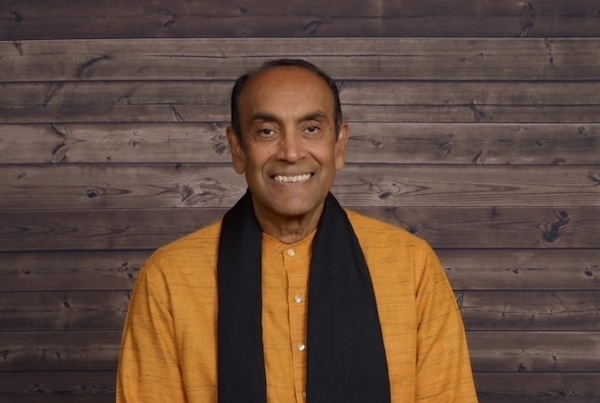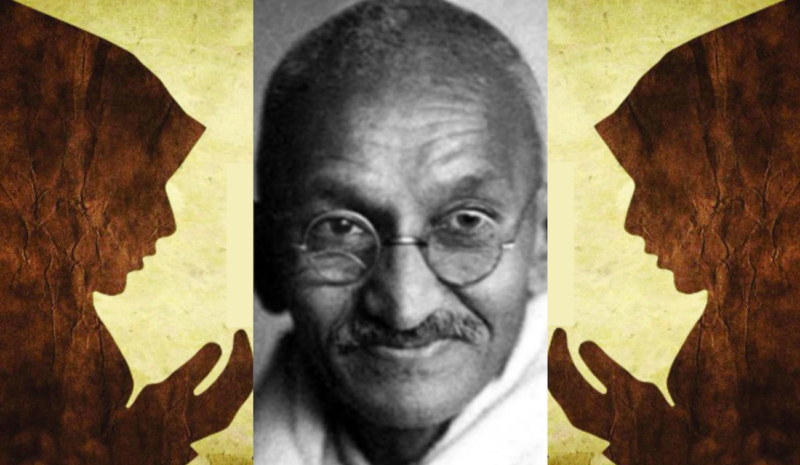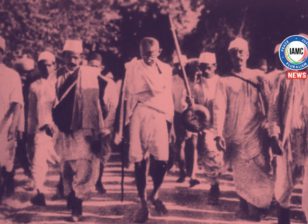Is Distorting Gandhi’s Favorite Bhajan a Part of Subterfuge That Glorifies the Mahatma’s Assassin Nathu Ram Godse?
By dropping Allah in “Ishwar Allah Tero Naam” at a Gandhi Jayanti celebration in Minnesota, a singer, wittingly or not, tried to erase everything that Gandhi stood for.
By KUHU SINGH
On Gandhi Jayanti this year, celebrated as Non-Violence Day on October 2nd, Minnesota Governor Tim Waltz, in a very bizarre move if you ask me, proclaimed the month of October 2021 as Hindu Heritage Month. Lo and behold! Every Minnesotan who happened to be a Hindu I met was in awe of the move – “Imagine! First time in U.S. history an entire month of the year has been dedicated to preserving Hinduism,” they whispered. “Nowhere in the world has this been done because slowly the world is waking up to the fact that Hinduism is under attack and needs to be preserved,” thumped another. I was confused – I explained, first, that Hinduism has never been under attack anywhere and, second, this proclamation was ONLY for 2021. Not every year. Shoulders were shrugged, I was given “whatever…” and moved on.
Why do I bring this up? Because something else recently caught my attention. At an event hosted by the India Association of Minnesota (IAM) at the Minnesota History Center to celebrate Gandhi Jayanti, a few wise Hindu men and women were heard taking credit for this move by Gov. Waltz. Not a big deal – “but why to bring this up on a day you’ve gathered to celebrate Gandhi and his heritage,” pointed out Raj V Rajan, an environmental engineer, an avid philatelic and an ambassador of Gandhian thoughts and philosophy. “Isn’t that like having Christmas or Easter named ‘Jewish Heritage Day’? If anything, October should not even be ‘Indian Heritage Month.’ It should be ‘South Asian Heritage Month’, shouldn’t it?” Raj was there as an honored guest and gave a talk on Gandhi. I was not there but my social media message box was full of aghast Minnesotans who were there and those who heard second hand, as I did.
Hindutva has been on the rise in the U.S., there’s no denying this. More and more prosperous Indian Americans are convinced by the mythology of Hinduism under attack narrative, albeit false. The rise of former President Trump and his extreme brand of right-wing fanaticism also saw a steep rise in extreme right-wing Hindutva, not a coincidence that India is in its second round of Modi-led government. At this same event, Gandhi’s favorite bhajan “Raghupati Raghav Raja Ram, Patite Pavan Sita Ram; Ishwar Allah Tero Naam, Sab ko Sanmati de Bhagwan” (We can call you Ishwar or Allah, bestow wisdom on all, God) was sung by a respected community elder. The shocker for Raj and others present there was the fact that this lady chose to change the lyrics of Gandhi’s favorite spiritual “Ishwar Allah Tero Naam” to “Ishwar Ram Tero Naam”. “Initially I thought I heard it wrong, but no — she repeated it multiple times throughout the song,” Raj told me.
One suspects, the singer, wittingly or not, changed a word in one of Mahatma Gandhi’s favorite bhajans and with it tried to erase and undermine everything that Gandhi stands for today, yesterday and tomorrow. There is a deliberate attempt by elements of Hindutva to deny and erode Gandhiji’s legacy. Hailing his murderer Nathu Ram Godse as a hero is also a part of this subterfuge.
“I am convinced that ethnocentric bigotry only ripens with age,” Raj says. “To see attempts to make an accepting and welcoming ancient faith evolve into just another self-righteous organized religion (almost to the point of proselytizing) is sad. It was heartbreaking. It felt like a loud slap in the face, and it is still ringing in my ears. Why? Why on this day? Why at this event?” Raj laments.
Why? For what purpose would you want to change the lyrics of this beloved bhajan that is so poignant and its lyrics defining everything Gandhi stood for – Hindu-Muslim unity, spirituality, and one-ness with each other and with God — be it Ram or Allah. He brought the country together to kick out a powerful empire through his non-violence movement and his ascetic lifestyle that thumbed its nose at everything the British Empire stood for. This elder has in the past justified the change in lyrics as something she had always sung since she was a little girl. That piqued my curiosity. I rang my septuagenarian mother in India and asked her if she’d heard the lyrics being anything other than Ishwar Allah. She said yes, but only by the RSS and the BJP, who never wanted to associate this bhajan with anything remotely Allah or Islam or Muslims.
“Why did the lyrics of the song “Raghupati Raghava Raja Rama” appeal so strongly to Gandhi? The most obvious answer is that it is addressed and praises his favorite form of God, Rama.” But it is so much more.
In this context, I also reached out to religious scholar and thinker Anantanand Rambachan, a professor of religion at St. Olaf College, Northfield, Minnesota and a world-renowned theologian on interreligious dialogues. “This is terrible but not surprising given the developments in recent times,” he says. His recent essay on Mahatma Gandhi and specifically this bhajan could not have been timely. This essay will be published later this month in a book, “Interreligious Heroes – A Spiritual Quest.”
“Why did the lyrics of the song “Raghupati Raghava Raja Rama” appeal so strongly to Gandhi? The most obvious answer is that it is addressed and praises his favorite form of God, Rama.” But it is so much more. In his essay, Prof. Rambachan argues that one of the important roles of religion and faith in God, for Gandhi, was the empowering of people to lift themselves and each other.

Anantanand Rambachan, professor of religion at St. Olaf College, Northfield, Minnesota.
“For Gandhi, the struggle for social justice is inseparable from the practice of nonviolence. Second, since God existed in all beings, the only way to find God, for Gandhi, was to see God in all beings and to identify oneself with all. The way to identify oneself with others is through love. This love requires the active and dedicated service of others. This was, for Gandhi, the meaning of liberation (moksha), and he saw his political action as inseparable from his quest for spiritual liberation. The communities (ashrams) founded by Gandhi in South Africa and India always included people of other faiths—Jews, Muslims, and Christians,” Prof. Rambachan says.
Dissecting the aforementioned lyrics, Prof. Rambachan notes that the movement from the chorus to the first verse is deliberate, profound, and instructive. “The chorus is centered on Rama and uses many of Gandhi’s favorite names of Rama. It then moves to refer to God by employing two names, Ishwara (Lord of blessings), from the larger Hindu tradition; and Allah (God), from Islam, the second-largest community. It proclaims these to also be the names of God (ishwara allah tero naam / sabako sanmati de Bhagavan [bless us to understand that your names are Ishwara and Allah]). Gandhi considered it wrong to regard our preferred name to be the only correct or true one and all others to be untrue or inferior. “I regard this as a fundamental interreligious insight for which Gandhi labored throughout his life and that inspires me deeply,” Prof. Rambachchan says.
“Our failure to recognize God’s oneness, as articulated in this song, has had and continues to have tragic consequences. It leads to the negativization of God outside of our traditions as inferior or false. Such negativization leads, in turn, to the devaluation of other religions. The devaluation of the other religion leads in turn to the condemnation of followers of those faiths who are perceived to be of lesser worth. Such condemnation creates the conditions for verbal hostility that then easily intensifies into violence. As Prof. Rambachan says, this song does not allow for the existence of a Christian, Muslim, Jewish, or Hindu God. It does allow for different understandings of God but not different Gods.
Because the event was organized by IAM whose bylaws specifically state that it’s a non-religious, apolitical organization and the singer was invited by them, I reached out to the IAM President as well as those associated with the event for a comment and to ask them why it was not corrected right then and there. Their answer – “this must have been a mistake. She is after all a senior citizen…” who must have been befuddled and I’m paraphrasing here. “It really makes no sense why if she did make a mistake, it was not corrected after she stopped, asks another person who was present there. IAM president did reach out and assured me that in no shape or form does IAM condone this or know that the singer would mishandle the lyrics and that in the future they would make sure there was some sort of a check and balance. Raj believes organizations that want to be inclusive and anti-racist should nip some sentiments in the bud. and never provide a platform for promoting them. Particularly when they come from elders and funders. If you are part of this community or organization, please speak up.
At the event, Raj shared a 100-year-old story about the 1921 Prince of Wales Royal Visit to India and the associated boycott and civil disobedience organized by the Indian Nationalist movement. “Lessons learned then apply even today. The rich protect the rich. The powerful defend the powerful. And they write all our history. And a few violent acts can discredit and destroy the entire movement for change. Nonviolence is not easy. It needs training and discipline- physical and spiritual.”
History is indeed a great teacher. These little acts of subversion, or denying history has bigger and greater consequences. Think of Nazi Germany and American Confederates and more recently idolizing Gandhi’s murderer and RSS recruit Nathu Ram Godse in India. We cannot let these supposed “mistakes” become the norm, thereby obliterating history.
Kuhu Singh lives in Eden Prairie, Minn., a suburb of the Twin Cities. Bidding adieu to journalism a decade ago, she nonetheless loves to write and express her very strong opinions on social media and blogs and sometimes in a few Indian publications. She is a Senior Digital Marketing Manager for a broadcast retail company. Race relations, diversity, social issues fascinate and roil her into action. She volunteers her time with certain political organizations and community organizations.
This article first appeared in American Kahani


